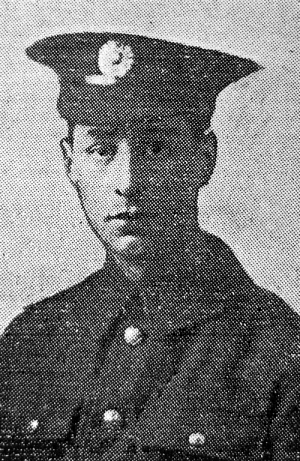
Joshua Mitchell was born in Ossett on the 24th December 1895, the youngest son of four surviving children: three sons and a daughter, born to Arthur Mitchell and his wife, Susannah (nee Tolson), who married at Ossett Holy Trinity Church on the 29th July 1880. The couple had five children from their marriage but one child had died before April 1911. All of the family were born in Ossett. Joshua was baptised at Ossett Holy Trinity Church on the 15th March 1896.
In 1901 and 1911 Arthur and Susannah Mitchell, with their three sons, including 15 year-old schoolboy, Joshua, were living on Church Street, Ossett where Arthur Mitchell worked as a rag dealer on his own account. At the time of Joshua’s death Arthur and Susannah Mitchell were living at ‘Holly Bush House’, Church Street, Ossett.
Joshua Mitchell’s army service record has not survived, but it is known that he enlisted in Dewsbury, and joined the Corps of Royal Engineers with service number 145053. He embarked for France in about June 1916 and he died of his wounds at St Luke’s Hospital, Halifax, on the 27th November 1916 (comment ‘RETC Newark’ on his record). Sapper Joshua Mitchell was posthumously awarded the British and Victory medals.
The war of 1914-1918 relied on engineering. Without engineers there would have been no supply to the armies, because the Royal Engineers maintained the railways, roads, water supply, bridges and transport. Royal Engineers also operated the railways and inland waterways. There would have been no communications, because the Royal Engineers maintained the telephones, wireless and other signalling equipment. There would have been little cover for the infantry and no positions for the artillery, because the Royal Engineers designed and built the front-line fortifications. It fell to the technically skilled engineers to develop responses to chemical and underground warfare. And finally, without the Royal Engineers, the infantry and artillery would have soon been powerless, as they maintained the guns and other weapons. Little wonder that the Royal Engineers grew into a large and complex organisation.
It is not known which theatre of war that Sapper Joshua Mitchell was fatally wounded at. It is likely that he was injured during the closing stages of the Battle of the Somme, which lasted from the 1st July 1916 until the 18th November 1916, but without details of the Division he served with, it is impossible to say exactly where he was when he was wounded.
The “Ossett Observer” 1 had this obituary for Joshua Mitchell:
“Well-Known Ossett Soldier’s Death In Hospital – Military Funeral Yesterday – Sapper Joshua Mitchell, of the Royal Engineers, youngest son of Mr. Arthur Mitchell, of Church-street, Ossett, on Monday evening died at a military hospital in Halifax, from wounds received on the battlefield on November 4th. The deceased, who was nearing his twenty-first birthday, enlisted at the beginning of the year. He was formerly employed by his brother as a plumber. He was a regular attender at Holy Trinity Parish Church. It was about five months since he went out to the front.
Following an engagement on the date stated, Sapper Mitchell was admitted to hospital with a severe wound in the side of his head, his skull being fractured. Today fortnight he was brought to St. Luke’s Hospital, Halifax, where his relatives have visited him. Though his condition has been critical from the first, he has at times been able to converse with his visitors. On Saturday his parents received a telegram, stating that the young soldier’s condition was worse. His strength gradually failed and he died on Monday evening.
The funeral took place yesterday (Friday) afternoon with full military honours, at the Wesleyan burial ground, South Ossett. It was preceded by a service at Holy Trinity Parish Church, the Revs. R.E. Burlingham, vicar, and C.E. Salisbury officiating. A large number of persons witnessed the funeral. The funeral cortege comprised, besides relatives, about sixty soldiers from the military depot at Pontefract, including a firing party and a brass and reed band. On the way from the deceased’s home to church, and afterwards to the burial ground, the band played appropriate music. At the conclusion of the burial service at the graveside the soldiers fired three volleys over the grave, and a bugler sounded the ‘Last Post’, the highest tribute to a departed soldier.”
The “Wakefield Express” 2 from 2008 had a further report about Sapper Mitchell’s grave being uncovered after 90 years:
“War Grave Uncovered – A First World War grave of the fist soldier from Ossett to be buried with full military honours has been uncovered. David Mitchell found the grave of his great-uncle, Sapper Joshua Mitchell, after volunteers cleared overgrown weeds and branches at St. John’s churchyard, St. Aiden’s Walk, South Ossett.
And the find comes during the 90th anniversary to commemorate the end of the First World War. Mr. Mitchell (64), of Station Road, Ossett is a liaison officer for Ossett Civic Trust. He said ‘We always knew his grave was in the churchyard somewhere, but it wasn’t until it was cleared that we found it. There are other war graves which have been uncovered.”
Sapper Joshua Mitchell, aged 20 years, son of Arthur and Susannah Mitchell, of Holly Bush House, Church St., Ossett, died on the 27th November 1916. He is buried and remembered by a special memorial at the Ossett (St John’s) Burial Ground, 3 St. John’s, Ossett, one of the seven military burials there.
References:
1. “Ossett Observer”, 2nd December 1916
2. “Wakefield Express”, 14th November 2008